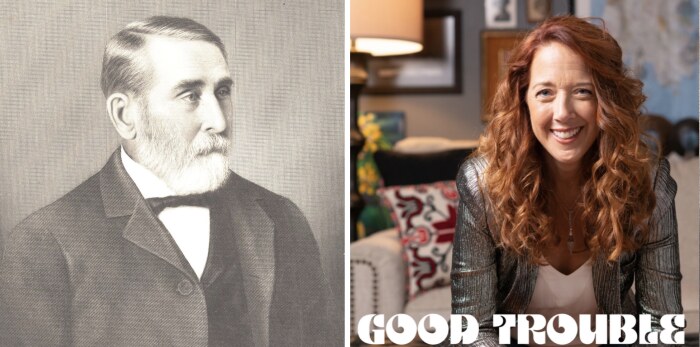This column by Daniel G. Clark about Alexander Clark (1826-1891) first appeared in the Muscatine Journal.
I like to think Beth Crookham is channeling Underground Railroader ancestors who came from Ohio in the 1840s.
I knew her in Muscatine about 20 years ago when she was a community activist, a promoter of the performing arts with a business background at her family’s sports-lighting company. Now she’s an East Coast producer, singer-songwriter, and recording artist.
As I write this column, I am enjoying her song “Good Trouble,” an homage to John Lewis and other nonviolent change-makers.
“Keep walking, keep walking | Won’t you take my hand | Keep talking, keep talking | And take a stand | Good trouble, necessary trouble”
Beth had a great-great-grandfather worth learning about. His portrait appears on screen in the 2012 public television documentary “Lost in History: Alexander Clark.” While voiceover narration condenses “pivotal years in Clark’s life” at the end of the Civil War to set the stage for his court case that will desegregate Iowa schools in 1868, we see Beth’s ancestor.
“State legislator John Lake Crookham moves to strike the word white from the Iowa constitution, and Clark’s campaign to get African-American men the right to vote finally succeeds.”
When credits roll, viewers see major funding for the half-hour program came from Musco Lighting and William Penn University. Those in the know recognize the fingerprints of Musco founder-owner and William Penn trustees-chair, Joe Crookham—Beth’s father and the great-grandson of the first judge in Mahaska County.
Let’s grant some hyperbole in the Portrait and Biographical Album of Mahaska County, Iowa (1887):
The Judge perhaps defended more criminal cases than any other lawyer in Iowa. It was his rule to defend and never to prosecute a case and fortunate indeed was the law-breaker who secured his services. His practice in this regard covered a large amount of territory and he was employed in important cases over the entire state. A lawyer of great caution, he prepared his cases with a great deal of care and was untiring in the production of the necessary evidence to sustain his theory of a case. On March 26, 1855, Judge Crookham was appointed commissioner by Governor Grimes to re-locate the state capital of Iowa, and it was he who drove the corner stake that located the [Des Moines] site.…
(Maybe another time I’ll share an anecdote from someone else who claimed to be the surveyor.)
The biography says he “was born an Abolitionist.” His brother Jefferson was his law partner and, back in Ohio, their father “was an old federal whig and assisted many a colored man to gain his freedom, his home being on the underground railroad of that day and his own son, Jefferson G., at one time drove a team that carried a load of these unfortunate people farther north.”
“At the session of 1867 he introduced a bill amending the Constitution of the State by striking out the word ‘white’, which amendment was adopted by the people, and made Iowa the first State in the Union to grant that privilege to the colored race.”
That may be true—I haven’t found his 1867 bill—but by then the amendment was passing both houses of the Republican-controlled legislature for the second time on its way to the 1868 referendum.
What fascinates me is the fact that he was introducing such bills as early as 1864.
“…Mr. Crookham, the author of the Negro Suffrage Bill, which was introduced in the Senate a few days since…is one of those peculiarly constituted individuals who oppose what everybody [else] favors and favors what everybody else opposes.” (Council Bluffs Nonpareil, February 13, 1864)
“Senator Crookham introduced a bill for an act to extend the elective franchise to certain persons who have been heretofore excluded. The bill includes white female citizens of the age of 21; all soldiers who have been honorably discharged; male citizens of foreign birth, of 21 years of age, and all male citizens of African descent. The introduction of this novel bill created quite a sensation in the Senate. After some discussion, it was referred to the Judiciary Committee.” (The Daily Gate City, Keokuk, January 18, 1866)
Muscatine Journal, January 20, 1866: “Senator J.A.L. Crookham…has a theory that the General Assembly possesses the power to extend the elective franchise to blacks in this State under the Constitution as it is, and he has therefore introduced a bill for that purpose, and will advocate its passage.”
Quoting the Desmoines [sic] Register, the report says he “is not by any means opposed to the proposed obliteration of the word ‘white’…but doesn’t want to wait three years to get a clip at that disqualifying objective, and therefore proposes to take the shoot indicated above to reach the object.”
While others dithered over limiting voting with tests for intelligence, literacy, property, military service, and—almost without saying—gender, John Abbott Lake Crookham said let’s do the right thing and do it now.
Good trouble, necessary trouble.
Next time: Pivotal years
Top image: John Abbott Lake Crookham and Beth Crookham. Link: https://www.bethcrookham.com


1 Comment
Need more John Lake Crookhams
Interesting story. We have Stony Age conservatives in the current legislature and unfortunately who have undone rights long held, including limiting voting rights, disallowing the core of American history, and have impugned public education and reduced teaching to a function instead of profession. I would like to know who or where is the leadership to restore civil society and protect our liberal democracy. Very nice piece. I look forward to next installment.
iowagerry Mon 27 Feb 8:14 AM